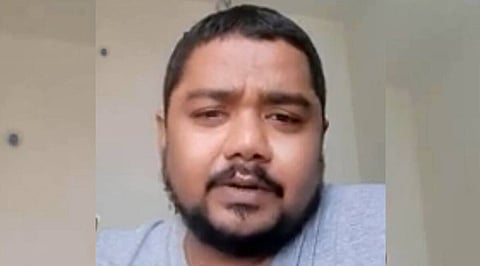Bengaluru: Dalit Man Takes His Own Life While Battling Caste Discrimination in the Workplace
In a tragic incident, a 35-year-old employee from Bengaluru, working at a private company, took his own life after filing a police report on June 3, alleging "caste discrimination and atrocity at the workplace." Prior to his suicide, Vivek Raj, a Dalit from Uttar Pradesh, recorded a video on YouTube, expressing his inability to continue the fight. Vivek, hailing from Kaptanganj Basti in Uttar Pradesh, resided in the Republic of Whitefield in Bengaluru's Brookfield area and worked as a visual merchandiser for Lifestyle International Private Limited.
Following the incident, Lifestyle International Pvt Ltd released a statement expressing deep sorrow over the demise of their former colleague. The company stated that Vivek had filed a complaint through their internal process, and after conducting a thorough investigation in accordance with business regulations, appropriate actions were taken and the results were shared with him. The company assured cooperation with the ongoing police inquiry, acknowledging its pending and under investigation status.
Co-workers Subjected him to Unfair Treatment
On June 4, Vivek's father, Rajkumar, aged 67, filed a complaint regarding his son's untimely death. The Whitefield police initiated an investigation under Sections 34 (acts committed by multiple people with a common intention) and 306 (abetting suicide). Prior to his demise, Vivek had lodged a complaint with the Marathahalli police against three of his co-workers, accusing two senior employees of unfair treatment based on his caste.
According to Vivek's complaint, the police initiated an investigation under Sections 3(1)(r) and 3(1)(s) of the Scheduled Castes and Scheduled Tribes (Prevention of Atrocities) Act, which prohibit the intentional abuse of SC/ST members by referring to their caste. While Vivek had raised the issue of caste discrimination with the company's HR department, it was not appropriately escalated, according to a police source.
It was only after the Assistant Commissioner of Police (ACP) intervened that an FIR was registered upon Vivek's visit to the Marathahalli police station. News reports suggest that Vivek's office had requested his resignation before June 18, seemingly linked to the complaint he had filed. Two coworkers, who were granted bail, have also sought to have their names removed from the FIR. Meanwhile, one coworker has been detained in connection with the incident.
Posted Video before Suicide
In his 8.08-minute video, posted on You-Tube channel, Vivek stated, “Fighting the system—whether it be in the public or private sphere—is challenging. Coming from a particular background, working hard, and studying hard causes you to change, advance, and become a better person. You strive to treat people nicely. But the world does not treat you well.”
He further addressed the Prime Minister, urging him to pay attention to the prevailing issues. Vivek called upon the SC/ST Commission, the police, and the Ministry of Corporate Affairs to be more vigilant, cooperative, and develop an effective grievance redressal system.
Social media campaign launched seeking Justice for Vivek
His video resonated with a small group of alumni from the National Institute of Fashion Technology (NIFT-B), who launched a social media campaign seeking responses from the company regarding compensation for Vivek's family, policy changes within the organization, and actions taken against the responsible individuals.
Caste discrimination at Work Places
Caste discrimination in the workplace is not a new phenomenon in India, as instances of such discrimination have been prevalent in society for a long time. However, caste-based discrimination has become a grave concern in modern Indian society, leading to an alarming number of suicides. Prejudice based on caste still persists in Indian society, with higher castes often subjecting Dalits to discrimination when they demand equal access to education, employment, and social standing. The injustice and abuse suffered by countless Dalits each year have resulted in numerous suicides.
Statistics reveal that, among Dalits, a total of 51 (63.75%) men have taken their own lives, compared to 29 (36.25%) women. The study further highlights that sexual abuse is the leading cause of suicide among Dalit women, while instances of Dalit women committing suicide due to other reasons are relatively rare. These suicide statistics were collected from various publications, periodicals, journals, and articles between 2011 and 2021, as documented in Robert W. Motta's edited volume 'Suicide.'
Over the past seven years (2015-2021), the number of Dalit suicide cases has steadily increased, with a higher number reported each year. While 2018 saw a slight decrease, 2020 witnessed the highest documented cases, with 19 reported incidents of Dalit suicide. As of May 2021, the print media has reported nine Dalit suicide incidents. Based on the trends observed in 2020, it is expected that the number of Dalit suicides will surpass the previous year's count by the end of 2021. These cases of Dalit suicide have been compiled from print media sources across 15 districts in 10 states.
You can also join our WhatsApp group to get premium and selected news of The Mooknayak on WhatsApp. Click here to join the WhatsApp group.

